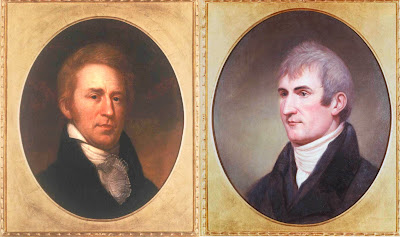Undaunted Courage
 |
| Portraits of William Clark (left) and Meriwether Lewis (right) by Chales Willson Peale |
 |
| When the Land Belonged to God by Charles M. Russell |
Fall 1804:
 |
| A page from Lewis's journal |
For Meriwether Lewis it was a magical time. He spent most of it exploring, walking on shore, venturing out into the interior, catching up with the boat at night...He was a great walker, with long legs and a purposeful stride, capable of covering thirty miles in a day on the Plains. As he walked, he was constantly at full alert, his eyes sweeping across the horizon, then coming down with complete concentration on a stone or a plant or an animal den at his feet. He carried his field journal so that he could note down new plants, animals, minerals, the general lay of the land, the apparent fertility of the soil, the types and numbers of game animals around him, and more.
But more than just the land was new - the people who knew it well, were new too. The various Indian tribes throughout the Louisiana Territory were both a help and a hindrance to the exploration party. But of course, the help of those Indians is certainly priceless. The party would probably not have returned to St. Louis intact if it weren't for many Indians who provided them with goods, food and guidance along the way.
 |
| The Lewis & Clark Expedition, 1918 Charles M. Russell |
What impressed me most of all was Lewis himself during the journey. What a man of the enlightenment! He seemed to know everything—medicine, botany, astrology, hunting, fishing, and—the most important thing—leadership. His ability to hold together a group of 31 men through the most difficult times of their lives and still have them trust him completely is astounding.
This quote I find particularly compelling and I relate to it:
He concluded his August 18 [1805] journal entry with an oft-quoted passage of introspection and self-criticism. "this day I completed my thirty first year. I reflected that I had as yet done but little, very little indeed, to further the hapiness of the human race, or to advance the information of the succeeding generation. I feel the want of that information which those hours would have given me had they been judiciously expended."
He shook the mood, writing that, since the past could not be recalled, " dash from me the gloomy thought and resolved in future, to redouble my exertions and at least indeavor to promote those two primary objects of human existence, by giving them the aid of that portion of talents which nature and fortune have bestoed on me . . . in future, to live for mankind, as I have heretofore lived for myself.


Comments
Post a Comment